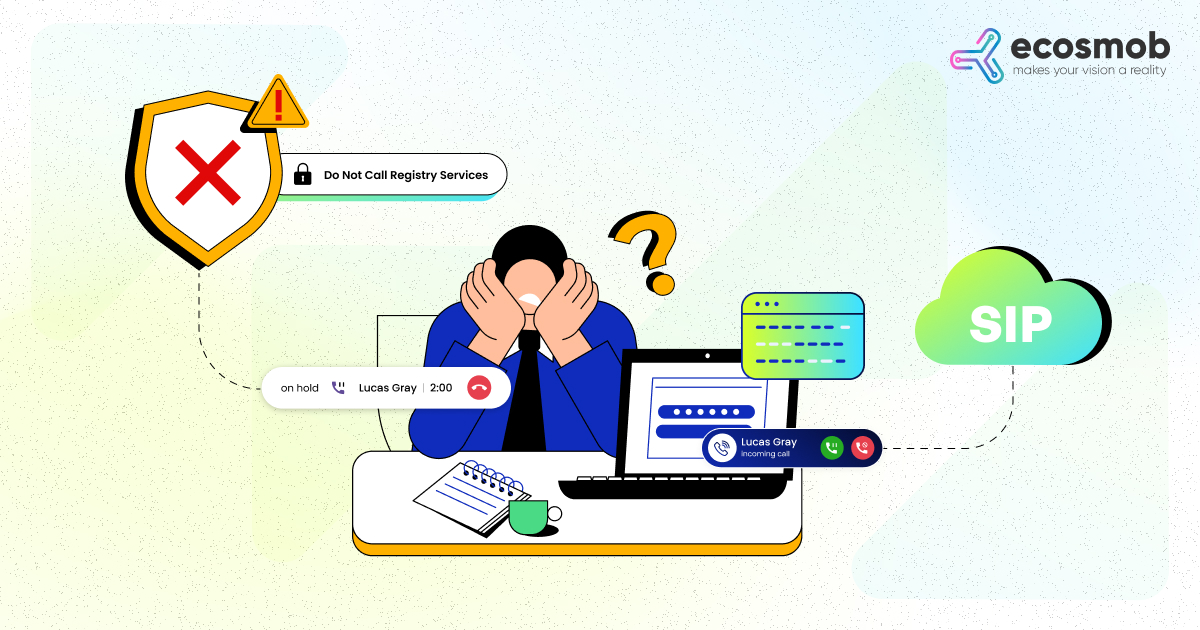In today’s fast-paced digital era, the telecommunications industry is transforming remarkably, thanks to the advent of Voice over Internet Protocol (VoIP) technology. VoIP has emerged as a game-changer, revolutionizing how we communicate, collaborate, and conduct business. This blog post delves into the impact of VoIP in the Telecom Industry, exploring one scenario where VoIP is reshaping the landscape and driving innovation. Let’s dive in!
According to a Global Market Insights, Inc. report in 2019, the VoIP industry will reach approximately USD 55 billion by 2025.
 How Long Has VoIP Been in the Telecom Sector?
How Long Has VoIP Been in the Telecom Sector?
VoIP has been in the telecom sector for several decades, dating back to the early 1990s. The concept of transmitting voice signals over IP networks instead of traditional circuit-switched networks was first introduced in the mid-1990s.
In the initial stages, VoIP in the Telecom sector was primarily used by early adopters, technology enthusiasts, and businesses with specialized requirements. However, as internet connectivity improved and the cost of data transmission decreased, VoIP became more widely adopted.
VoIP in the Telecom sector began to be embraced as a viable alternative to traditional telephone systems in the late 1990s and early 2000s. Initially, the quality of VoIP calls and reliability were concerns. Still, advancements in technology, such as the development of codecs for efficient voice compression and improved network infrastructure, addressed these issues.
How Is VoIP in the Telecom Sector Used in Businesses?
Consider a Scenario in which Ecosmob’s creative approach helps clients resolve conference calling-related challenges. The client is a B2B provider of video conferencing, unified communications, collaboration, and contact center solutions for service providers.
Effective Root Cause Analysis
The study highlights the company’s systematic troubleshooting process, pinpointing the problems’ root causes and implementing practical solutions. The case study provides valuable insights into best practices for diagnosing and addressing conference call issues in a VoIP environment.
Challenges
The challenges that the US-based company was facing in its search for a development partner to work on module development for VoIP solutions can be described as follows:
- Business Outlook: The key hurdle for the organization was choosing the best development partner who could understand the nuances of its business and work in tandem with the in-house team.
- Qualified QA: The business was trying to find a reliable partner who could also support performing QA checks.
- All-round knowledge: The B2B company was searching for a skilled and knowledgeable partner who could expertly navigate challenges and possess an understanding of third-party systems.
Solutions
By identifying and addressing these challenges, the US-based company dives in and aims to find a qualified and reliable development partner capable of effectively collaborating on module development for their VoIP solutions.
The Ecosmob team comprised a project manager, developer, and QA specialist, each playing a crucial role in managing the project deliverables and closely coordinating with the client’s team members. This collaboration ensured effective communication and the efficient execution of tasks.
- Robust Google Calendar plugin: The team’s primary objective was to develop a robust Google Calendar plugin for the client’s existing audio/video conference system. This plugin would enhance the system’s functionality by integrating seamlessly with Google Calendar, enabling users to schedule conference calls directly from their calendars.
- Plugin’s Quality and Scalability: To ensure the plugin’s quality and reliability, the team included a dedicated QA specialist. This specialist conducted regular checks and testing on the client’s applications, identifying and addressing any issues or bugs. Their efforts aimed to provide a seamless and error-free user experience.
- Highly Skilled Experts: In addition to their technical expertise, the Ecosmob team possessed extensive knowledge of the business environment and third-party systems. This understanding allowed them to adopt innovative techniques during the development process. By leveraging their expertise, the team was able to design and build a plugin that met the client’s requirements and provided an intuitive and user-friendly experience.
Overall, the Ecosmob team’s collaboration, technical skills, and business knowledge enabled them to successfully deliver a robust Google Calendar plugin for the client’s audio/video conference system. Through their innovative approach and attention to quality, they ensured the plugin’s seamless integration and enhanced functionality, allowing users to schedule conference calls conveniently from their calendars.
Read More: How VoIP Softswitch Benefits Telecom Operators?
Effective Ways in Which VoIP in the Telecom Industry Impacts
- Cost Savings: One of the most prominent advantages of VoIP in the Telecom Industry is its cost-effectiveness. Traditional phone systems often have expensive hardware, complex infrastructure, and costly long-distance call charges. VoIP eliminates the need for dedicated telephone lines as it utilizes existing internet connections. It reduces infrastructure costs significantly, allowing businesses and individuals to save on installation, maintenance, and long-distance calling expenses.
- Multichannel Communication: VoIP in the Telecom sector extends beyond voice calls, enabling call centers to adopt a multichannel communication approach. With integrated support for email, instant messaging, and video conferencing, call centers can provide customers with various communication options. This flexibility enhances customer satisfaction, enables efficient issue resolution, and improves first-contact resolution rates.
- Advanced Functionality and Integration: Besides voice calls, VoIP in the Telecom sector offers advanced functionality. These include instant messaging, video conferencing, voicemail, call forwarding, auto-attendants, call recording, and more. Moreover, VoIP seamlessly integrates with other business applications, such as CRM systems, email clients, and collaboration tools, boosting productivity and streamlining communication processes.
- Enhanced Communication Quality: Although early VoIP in the Telecom sector had occasional issues with call quality, advancements in technology have significantly improved voice and video quality. With the availability of high-speed internet connections, HD voice and video calls have become the norm. VoIP in the Telecom Industry also allows for superior call routing, reducing latency and ensuring crystal-clear conversations, irrespective of geographical location.
- Global Reach and Virtual Phone Numbers: VoIP in the Telecom sector eliminates geographical limitations, enabling businesses to establish a global presence effortlessly. With virtual phone numbers, companies can have local numbers in multiple countries, enhancing their accessibility and credibility internationally. This VoIP in the Telecom Industry feature is especially beneficial for businesses operating in various regions or those looking to expand their customer base globally.
- Integration of Artificial Intelligence (AI) and Automation: As VoIP technology evolves, it integrates with AI-powered applications, opening up a new realm of possibilities. AI-enabled voice assistants can handle customer queries, route calls, and provide personalized experiences. Automation features streamline repetitive tasks, freeing up valuable time for employees to focus on enhanced strategic activities. These advancements strengthen customer service, optimize workflows, and increase operational efficiency.
The scenario described above is one of many ways to transform VoIP in the Telecom Industry. VoIP technology empowers call centers and businesses to optimize customer service operations, improve efficiency, and deliver exceptional customer experiences. The cost savings, scalability, advanced features, multichannel communication, and CRM integration capabilities of VoIP contribute to a more agile, productive, and customer-centric call center ecosystem.
As VoIP in the Telecom sector continues to evolve and new technologies like Artificial Intelligence (AI) and the Internet of Things (IoT) integrate, the Telecom Industry acts for even more remarkable advancements. Embracing VoIP is no longer an option but a necessity for businesses seeking a competitive edge in today’s digital world. The VoIP in the Telecom Industry must harness the power of VoIP to reshape its future, making communication more efficient, convenient, and customer-focused.
It can be a shortlist of benefits since listing everything might make this short article a little university thesis. The industry is increasing by huge margins, from $83 Billion in 2015 to an expected $140 billion in 2021. One of the biggest jumps in the usage of VoIP happened during the coronavirus pandemic, which required a lot of businesses to modify.
Enhance Collaboration and Productivity with VoIP in Telecom
Why Is VoIP in the Telecom Industry Transforming?
VoIP (Voice over Internet Protocol) is gaining prominence and taking over the Telecom sector for several reasons. Here are some factors contributing to the increasing adoption of VoIP in the Telecom Sector:
- Enhanced Features and Functionality: This VoIP in the Telecom sector offers many advanced features that improve communication efficiency and productivity. These features include call forwarding, call waiting, voicemail-to-email transcription, conference calling, video conferencing, virtual attendants, and more. Such capabilities empower businesses to streamline their communication processes and enhance collaboration.
- Scalability and Flexibility: It is highly scalable and adaptable to changing business needs. Adding or removing lines, extensions, or users can be done quickly without extensive hardware upgrades. It provides flexibility to businesses, particularly those experiencing growth or fluctuations in communication requirements.
- Cost-Effectiveness: VoIP in the Telecom Industry offers significant cost savings compared to traditional telephony systems. Since it operates over the internet, it eliminates the need for separate data and voice networks. Businesses can consolidate their communication infrastructure and reduce hardware, maintenance, and long-distance calling expenses.
- Quality and Reliability Improvements: VoIP technology has matured over the years, leading to significant call quality and reliability advances. With advancements in internet connectivity, network infrastructure, and codecs, voice transmissions have become more stable and comparable to traditional phone systems.
- Future-Proof Technology: As VoIP in Telecom networks continues to evolve, transitioning to VoIP positions businesses to align with the future of communication technology. VoIP is well-suited to leverage emerging technologies such as artificial intelligence (AI), the Internet of Things (IoT), and cloud computing, enabling businesses to leverage innovative solutions and stay competitive.
To know more, Read: Custom Telecom Software Development – Detailed Guide
The combination of cost savings, flexibility, advanced features, global reach, integration capabilities, improved quality, and future-proofing potential has made VoIP an attractive choice for businesses across various sectors, leading to its increasing dominance in the VoIP Telecom Industry.
VoIP-The Future of Technology
It will be some years before the Telecom Industry’s PSTN phases out of VoIP. VoIP will surely take the place of traditional telephony when that time comes. End consumers, Telecom firms, and regulators have all made decisions already. They both concur that VoIP will be the most practical telephony solution in the future. Future communications will not rely on phone lines and associated infrastructure. Instead, connection speeds and other comparable elements will be its main driving forces. The VoIP in Telecom technology of the future is already in use by companies and household users who have switched to VoIP.
Final Thoughts
VoIP has undeniably transformed the Telecom sector, offering numerous benefits and reshaping communication. Its colability, advanced features, enhanced communication quality, global reach, and integration with AI have made it a game-changer for businesses and individuals. As technology continues to evolve, we expect VoIP to revolutionize the Telecom Industry further, bringing forth more innovations and opportunities for improved communication. However, if you want to adopt VoIP in the Telecom sector, contact Ecosmob Technologies. Ecosmob has expertise and knowledge in creating unique VoIP solutions. Numerous clients worldwide have taken advantage of our VoIP integration and development services. To discuss your requirements regarding VoIP in the Telecom sector, get in touch with us.
















